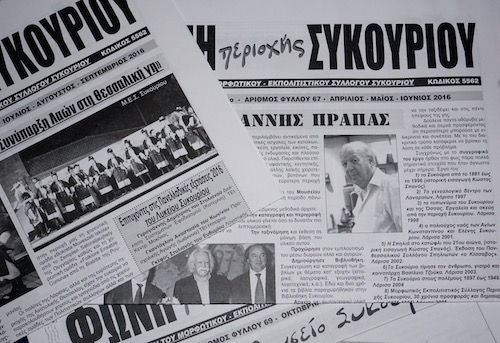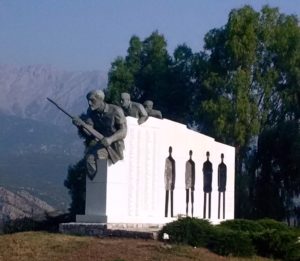I missed my grandmother by 10 days. Born in 1916 in a small village in Greece, she died of breast cancer just before I was born. I learned about her through pieces of her life told over dinner conversations and flashbacks from my mother’s childhood in Montreal. My grandmother left her village for Athens, she went to university, she lied about her age to find a husband, she joined the Greek Resistance against the Nazis, she was arrested and severely beaten, she fled to Canada with her two small children. And at some point, she was raped.
Mother talked about Grandma Ariadni in fragments, only divulging a single story at a time to keep Grandma relevant. Mother did not sit down and recount Grandma’s life story as though she were a relic from our ancestral past—imitations of a thick Greek accent brought eruptions of laughter to our dinner table regularly.
Mother held a great sense of pride in the woman determined to raise three successful daughters in the working-class Park Extension neighborhood of 1960s Montreal, but this pride was usually short-lived. Mother’s memories of Grandma’s words shifted to focus on her behavior. “She was sad a lot,” Mother often said. We just assumed the pain of leaving her village for Athens during the civil war, then fleeing her country with her two young daughters to join her husband in Canada, was a heavy burden to bear.
Grandma Ariadni came from a family of wealthy landowners who chose not to support the authoritarian regime during and after the civil war in Greece between 1946 and 1949. Targeted, they were forced to declare support for the government. When her 18-year-old brother was arrested for being a Communist (allegedly) and fighting against the regime (accurate), he refused to sign a declaration of repentance and was imprisoned. But as the wife of a soldier who fought against the Nazis, Grandma was allowed to exit the country before her family had their passports confiscated. It would be almost 20 years before her brother was granted amnesty and released from prison and many decades before she returned to the country of her birth.
These details of Grandma’s life were unsettling, but the source of her pain was much worse.
•
Family secrets do not come out easily. They often trickle out of mumbling voices when few people are listening, or are blurted out in moments of angry intoxication, resulting in humiliation. Sometimes, family secrets are stumbled upon by unsuspecting relatives who sought the assistance of experts in family history in hopes of recovering stories from childhoods long gone. When family secrets are unveiled, they rarely linger in the limelight. Shame, pain, embarrassment take hold and drag them back to the dark corners of silence.
•
I remember the moment that marked the beginning of my journey with trauma. When I was eight years old, I came across the cover of a magazine lying on the kitchen table. An African-American family had been shot to death and their bodies were sprawled across the front page. The next day, I stood in the stairwell of my daycare center waiting for my parents to pick me up. My mind was fixed on that image. I was petrified someone was going to shoot me too. Not long after, I developed a fear of the dark. Stuck to a belief that someone could hide in the darkness and hurt me.
After I hit puberty, this trauma turned into a fear of being sexually assaulted. My parents put a lock on my bedroom door when I was 11 years old and I locked it almost every night. Some nights I left the light on while I slept. As I lay on my bed at night, I pressed my back against the wall to ensure no one could grab me from behind. Timmy, my teddy bear, slept in front of me and served as a buffer in case someone tried to grab me from the front. I tightened my fingers around Timmy’s stomach and created pleasant images in my mind as I tried to calm myself to sleep.
Any creak in the house, dog barking outside, furnace starting up in the winter sent a shock through my body that shot my eyes open. I got out of bed, still clutching Timmy, to investigate the noise. Slowly opening my door, I stepped into the hallway, checking for any signs there was someone in our house. I sometimes stayed awake all night, unable to sleep until 5am when the sun began to peek through my blinds. I was convinced the sunlight could protect me from harm.
When I was 17 years old, I had a moment of self-reflection. Sitting on the corner of my bed and staring down at the beige carpet, I wondered if I was crazy. I knew my fear was not normal. How could I be terrified of something that had never happened to me, something I had never witnessed? I contemplated whether I had been raped in a past life and was now forced to relive this terrible burden. My mind remembered something my body had never experienced.
Though I did not know it at the time, my answer arrived with a newsletter from Greece.
•
The morning began like any other weekend family breakfast in Montreal. Five of us loosely seated around a kitchen table designed for ten people. We had to raise our voices to make sure the sound carried across the table. As though Mother needed another excuse to shout. “I can’t help it, I’m Greek,” Mother always responded, whenever I complained about her voice interrupting my concentration or drowning out the noise of the television. Mother started recounting stories from her childhood in Montreal. The small apartment Mother shared with her parents and sisters, getting locked out when she returned too late from a night out, and setting all the clocks ahead by one hour so her older sister would think she was late for school and watched in belly-aching laughter as her sister rushed into the shower in a panic.
I had heard these stories so many times. I began to laugh before Mother delivered the punchlines. It had become a repetitive indulgence into Mother’s journey back to her childhood. But this time was different. Mother’s wide smile shrank back into her cheeks and she was overcome with a solemn silence. A newsletter from Grandma Ariadni’s village had arrived at our house a few weeks before, in response to an earlier inquiry from Mother. It gave a history of the village and discussed events that took place during World War II and the Greek civil war that followed.
Some of it we already knew. Grandma was part of the Greek resistance, a network of armed and unarmed groups who resisted the Italian and German occupation of Greece during World War II. She even saved a Jewish child from the Nazis by pretending the child was her own. Mother only discovered this fact after they fled to Montreal and a woman came to their apartment to thank Grandma for saving her life.
As Mother continued to recount the information in the newsletter, her voice softened. The pause between each word lengthened and she became more hesitant. I stopped chewing and placed my fork back on my plate. My eyebrows tightened as I looked at Mother in confusion. She wanted us to listen. She was trying to show us that the words we were about to hear would likely not be repeated. “Your grandmother was arrested,” Mother said, “and we think she was raped.”
I do not remember if Mother said anything else. My thoughts hung on that last word: rape. Was she raped in prison? By the police? All the newsletter provided was a single word, “traumatized.” A euphemism, Mother suspected, that in all likelihood could only mean one thing when describing a woman’s experience during war. A euphemism that seems unusual, an attempt to avoid describing what actually happened, but one that accurately describes the lingering feelings that stay with victims of sexual assault: trauma.
•
Dead relatives never really disappear. They hang on walls in photographs that fade over time. If the photographer captures them at the right angle their eyes follow you as you move across the room, as if to say, I am still with you. They also come alive when their names flow off the tongues of descendants who can never forget them. Grandma Ariadni often sat with us at the dinner table. Perhaps the slices of feta cheese and Greek honey dripped into tea cups reinvigorated her spirit inside Mother and brought her closer to us.
Dead relatives also live inside of us, in our genes. We are the assembled pieces of their DNA. But DNA is not static, it can be changed by trauma. When a relative survives an intensely traumatic experience like rape, a hormone naturally produced in the body in reaction to stress, cortisol, can cause changes to their biology. When traumatic experiences are severe enough, these hormonal changes can lead to post-traumatic stress disorder (PTSD). The effects of PTSD are so enduring they can be passed on from parents, or grandparents, through a process called intergenerational transmission. We inherit our relatives’ hair and eye color, and we inherit their pain.
•
While studying pregnant women who were in the World Trade Center during the attacks of 9/11, Dr. Rachel Yehuda, Professor of Psychiatry and Neuroscience at the Mount Sinai School of Medicine, found that women who had lower cortisol levels gave birth to babies with lower cortisol levels as well. She realized PTSD in mothers was related to PTSD in children.
Yehuda explains the importance of cortisol within the context of PTSD as follows: Cortisol helps decrease adrenaline released during “fight or flight” when someone experiences high levels of stress. These lower levels of cortisol are significant because it becomes more difficult to bring down the sympathetic nervous system, which can lead to the formation of traumatic memory and triggers. Though the science is evolving and has not reached a point where cortisol can be used to diagnose people with PTSD, these findings have allowed clinicians to better understand there are biological factors that affect the stress systems of people suffering with PTSD.
Yehuda discovered that mothers exposed to trauma in the middle of their second or in their third trimester were more likely to transmit lower cortisol to their babies. She also found that a person did not necessarily have to experience trauma after birth to be at risk for PTSD. A fetus could have a biological reaction solely due to the mother’s stress hormone levels during pregnancy.
Incidentally, Mother suffered two big losses during her third trimester while she was pregnant with me. Two months before I was born, my paternal grandfather suffered a fatal heart attack. A month later, Grandma Ariadni lost her battle to breast cancer. The stress of these tragic events compounded with the as-yet-unknown details of Grandma’s rape, created the perfect scenario for trauma to be transmitted to me.
Was I harboring the effects of trauma from Grandma and from Mother?
I may never know. Having never met Grandma Ariadni, I cannot determine whether she herself had PTSD. There is only so much you can assemble of a dead relative you’ve never met without a diary or other written record of their life. Mother’s perceptions that she was sad a lot and often cried suggest that Grandma may have, in fact, had PTSD. But Grandma never told her daughters, or likely even her husband, about her rape.
We do know there were social consequences because of her assault. Her rape was likely the reason Grandma’s mother sent her to Athens. It was a small village, it was the 1940s, and it was hard to keep events like rape quiet. She could not stay—who would want to marry her in that “condition”? Perhaps there was speculation she might be pregnant. Perhaps she was, in fact, pregnant and needed to move to the big city to deal with the situation in a manner not acceptable in her village. Or, perhaps in her small village, a young woman who was raped simply could not be a suitable marriage partner.
To the capital city she went. In Athens, she could knock a few years off her age. In Athens, she could present herself as a normal woman, desirable in every way. A woman who was not harboring a village secret. But no matter how effective Grandma was at concealing her truth, her genes would not forget.
•
Sometimes people with trauma from intergenerational transmission can heal if they address the source of their trauma. So I took my first trip to Greece last summer, where I had the opportunity to visit the memorial to Greek Resistance fighters in World War II. While squeezed uncomfortably onto a 54-seat tour bus traveling across the classical sites of the Peloponnese, our tour guide turned on the microphone: “To your left…” She began to tell the story of the fighters of the Greek Resistance.
After the civil war, the authoritarian regime and the military junta that governed Greece into the 1970s ignored the efforts of the resistance fighters. Many fighters escaped to Yugoslavia during the civil war and were blocked from returning until the fall of the military regime. It took decades for their work to be recognized. The monument was erected in recognition of their struggle.
When Mother visited Grandma’s village a few years ago while on a journey to reconnect with distant relatives, she met the village historian. He told her about Grandma’s actions during the war. Some of her brothers were fighting against the authoritarian regime and she was arrested in hopes of divulging their location. She refused and was severely beaten. Bones in her face were broken, and Mother later wondered whether she may have been raped in prison. But she never divulged their location. She was good at keeping secrets.
As I listened to the tour guide talk about the resistance fighters, something within me began to quiver. It was as though decades of shame were dislodging themselves from me. I concentrated on the moving roadway passing under the bus to prevent tears from rolling down my cheeks. I turned my head back to watch the monument fade into the distance. A symbolic recognition of the sacrifices Grandma Ariadni made for a country that ultimately disowned her. And then came an inner peace. I returned home to Canada feeling refreshed. I can now sleep through the night. I am no longer afraid.
•
 Angela is a writer based in Ottawa, Canada. A historian by training, she is constantly in search of new ways to weave the past into her writing. Her work is forthcoming in Overland Literary Journal. Her first collection of poetry, Four Steps to Overcome Prejudice, is forthcoming. Follow her on twitter @angewrig.
Angela is a writer based in Ottawa, Canada. A historian by training, she is constantly in search of new ways to weave the past into her writing. Her work is forthcoming in Overland Literary Journal. Her first collection of poetry, Four Steps to Overcome Prejudice, is forthcoming. Follow her on twitter @angewrig.


